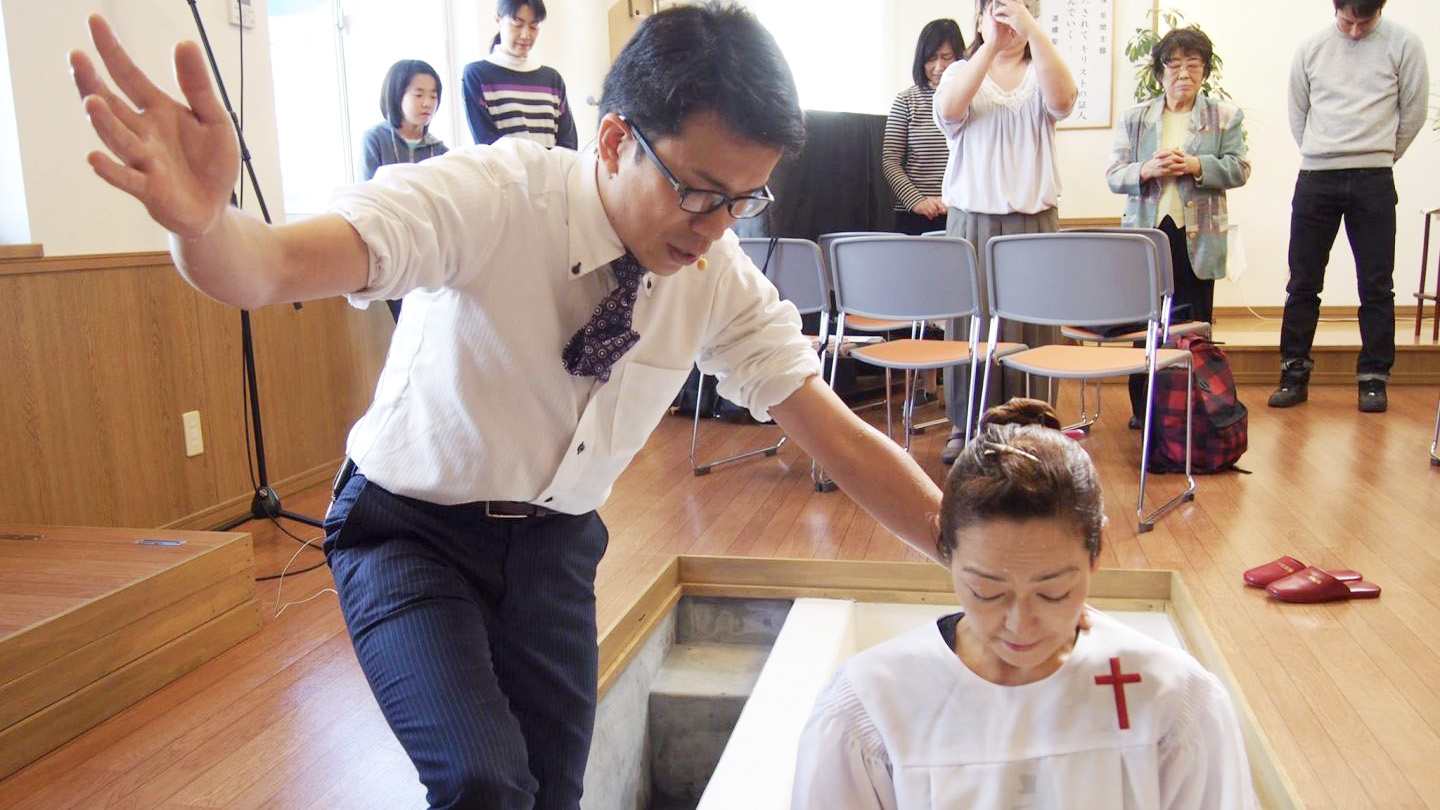
Pastor Takashi Funatogawa baptising a new member of Sapporo Minami Evangelical Christ Church. All photos courtesy of Pastor Takashi Funatogawa.
A pastor in his 30s might not raise any eyebrows in Singapore.
But in Japan, where 90% of Japan’s pastors are over the age of 50, youthful Pastor Takashi Funatogawa stands out among local church leaders in Hokkaido.
In October 2015, at age 34, Pastor Takashi (a jaunty “Pastor Tak” to his Singaporean and American friends) took over from long-time pastor Yasuji Honda to be installed as the senior pastor of Sapporo Minami Evangelical Christ Church.
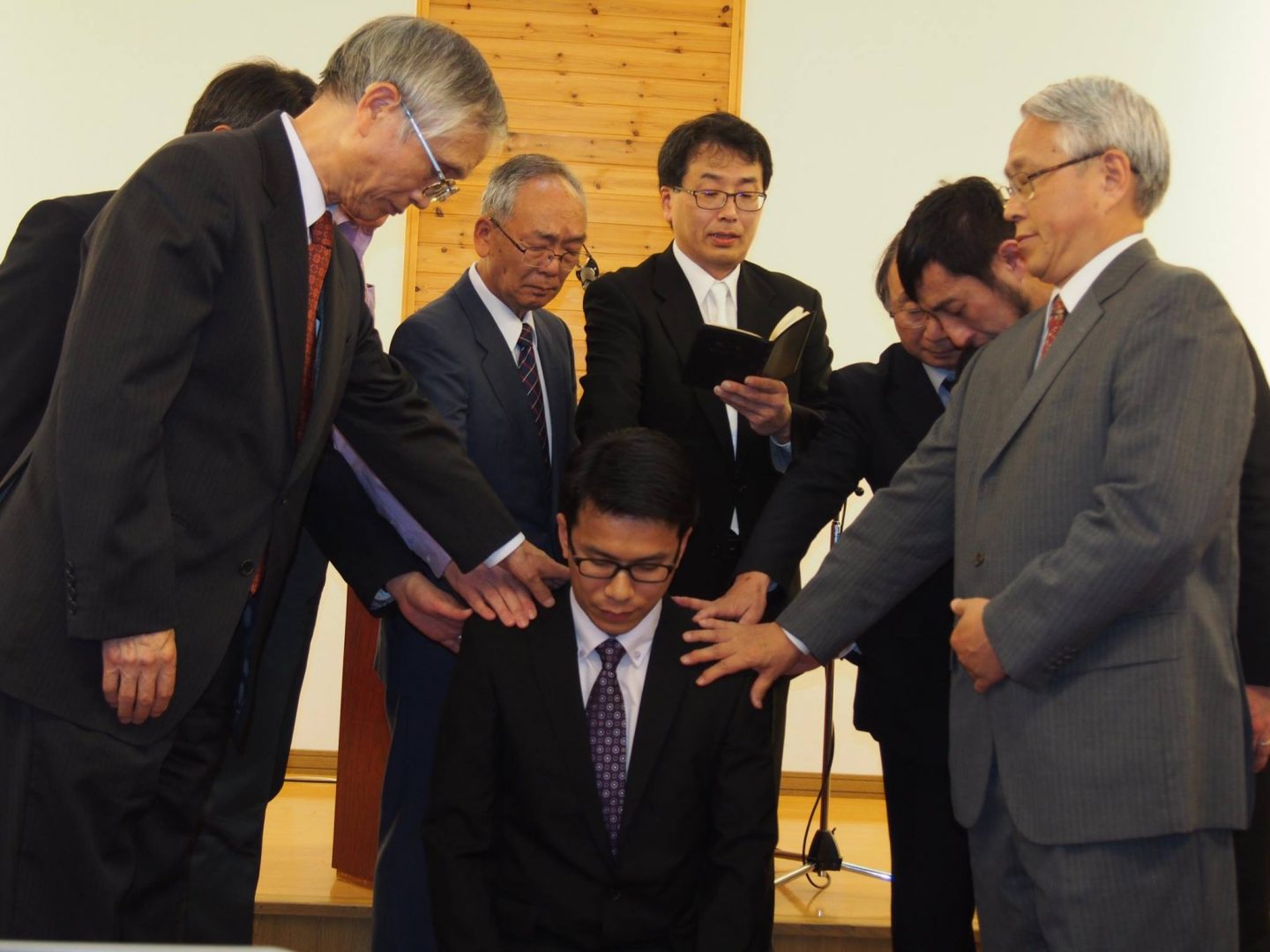
Pastor Takashi Funatogawa (kneeling) being installed as the senior pastor of Sapporo Minami Evangelical Christ Church in October 2015. He took over the mantle from Pastor Yasuji Honda (second from left).
Pastor Tak and his wife, Suzuko, now serve together in the church, where they are a bright spot in a country considered by many as “hard ground”, and where only 6% of church goers are below the age of 30.
That Pastor Tak was called to minister to his fellow Japanese was more unexpected than one might think.
Growing up in the UK and US, Pastor Tak had lived a westernised lifestyle. His home country of Japan had become distant.
Until God called.
Dropping out
“I had a very strict father, so expectations were quite high, it was a very typical Asian home,” reveals Pastor Tak, who spent most of his formative years in the UK and US.
Encouragement was rare, criticism was more common.
To please his parents, he dutifully followed the path they set out for him. But he soon dropped out of university in the US as he realised his parents’ dream was not his.
He took to alcohol, in the hope that it would numb him from his reality and his disappointment with himself.
But it did not.
At the height of his alcoholism at age 20, he encountered Christ and accepted Him as his personal Lord and Saviour.
Determined to turn his life around, he stopped drinking and dived headlong into work – teaching English to international students in Santa Barbara, California.
“Dropping out of university was kind of like a shame for me,” he reveals. “When I began working, everyone around me had graduated university and I didn’t want to be looked down upon so I worked my socks off.
“I kind of overdid myself and I think that, partly through stress, I ended up with Bell’s palsy.”
Healing wounds
For three months in 2006, he was left paralysed on the right side of his face and bedridden.
“Lord, use me as your vessel to reach out to the next generation.”
Upon his recovery, he moved back to Japan in 2008 to live with his parents. He was unsure about what it would be like to live with his parents again, after all that had transpired since he moved out for university.
Little did he know that, while he was in university, his father had accepted Christ through his mother, who became a Christian while they were living in the UK.
“The time we spent together was a time of healing and restoration for me,” said Pastor Tak, as he witnessed first-hand his father’s dramatic transformation.
“He would pray for me, affirm me and comfort me. It was the Lord working through my father and healing my wounds and the emptiness I was carrying within me.”
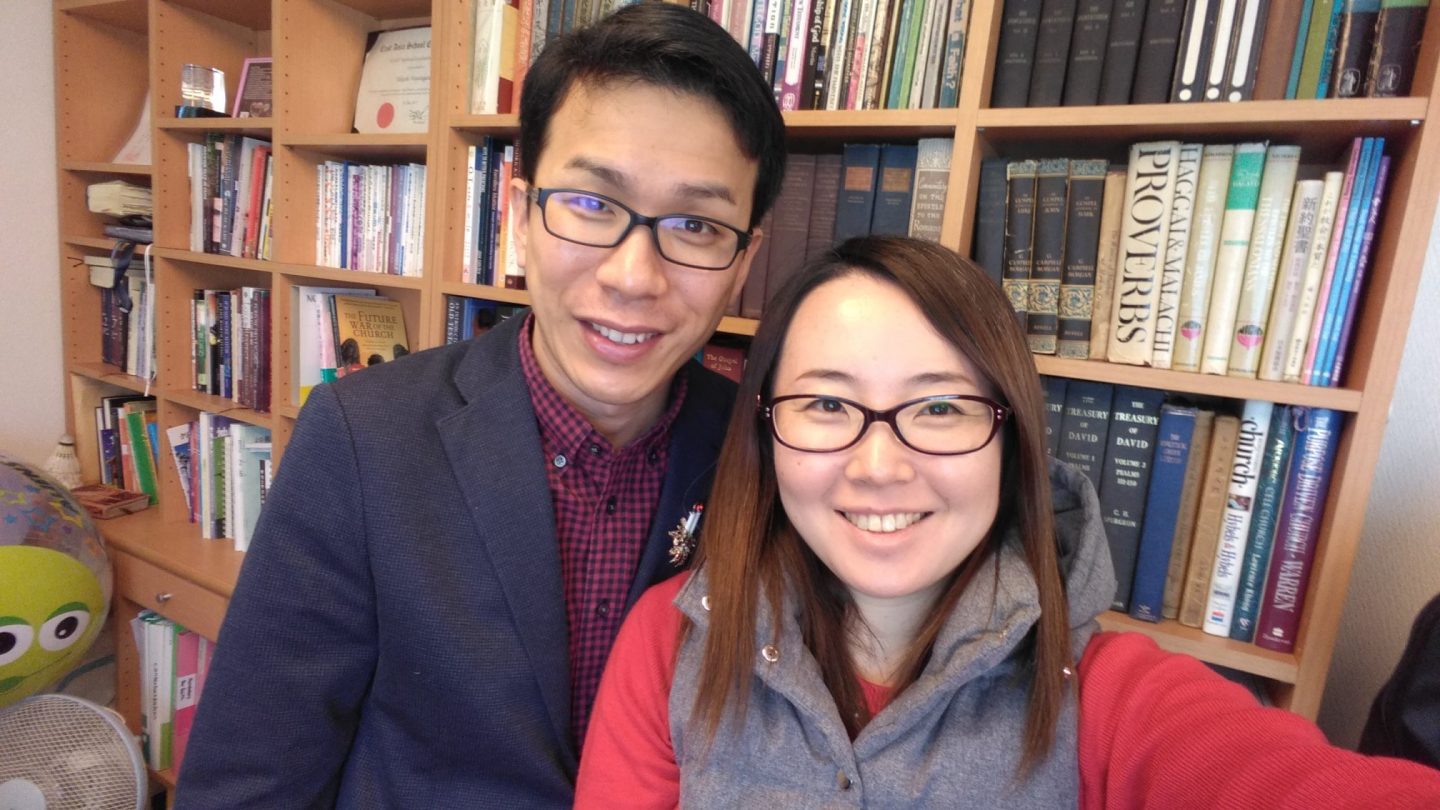
Pastor Tak and his wife, Suzuko, organise children’s festivals and English classes in order to take the church to the community.
As God did an inner work in him, Pastor Tak also delved deep into Scriptures and attended the dawn prayer meetings in Atsugi Evangelical Free Church in Kanagawa Prefecture, near Tokyo.
It was during this time that the Lord called him to reach out to the next generation of Japanese.
“A lot of youths are going through the same things I went through – workaholism or alcoholism. That’s when I gave my life to the Lord. I said, ‘Lord, use me as your vessel to reach out to the next generation.’”
With that, he returned to Yokohama, Japan, to be an English teacher.
It was also during this time that the desire to go into full-time ministry was ignited.
Going home
Having spent 21 years outside of Japan, Pastor Tak’s grasp of Japanese was not strong. Hence, attending Bible school in Japan was out of the question.
But Suzuko had a chance encounter with Reverend Edmund Chan, who spoke at the 60th Evangelical Free Church (EFC) Japan anniversary, which led Pastor Tak to pursue theological studies in Singapore instead.
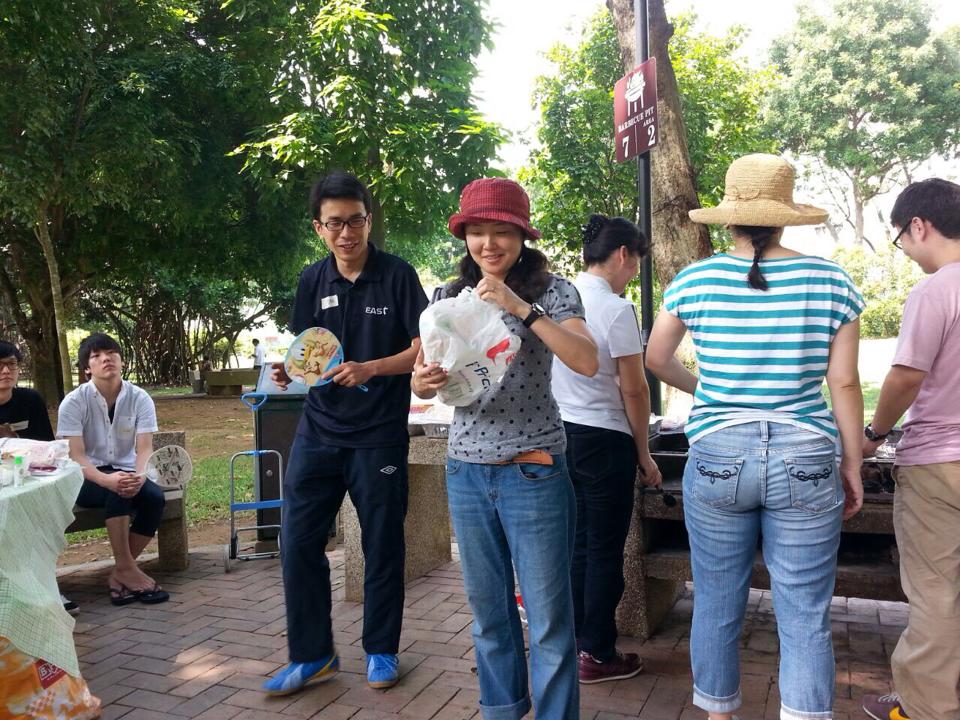
Pastor Tak (in black) and his wife, Suzuko (in red hat), hosting a barbecue outreach for Japanese living in Singapore.
During this time, Pastor Tak and his wife, Suzuko, were also involved in a ministry reaching out to the Japanese living in Singapore.
When he was about to graduate from the East Asia School of Theology (EAST), an elderly pastor from Hokkaido flew to Singapore just to meet him after hearing about him from another pastor in Korea.
Pastor Yasuji Honda, who has a heart for discipleship, was looking for someone who shared the same vision as him to take over his church in Sapporo. He had looked all over Japan but to no avail.
The meeting confirmed what God had sown in both their hearts.
In October 2015, Pastor Tak took over from Pastor Yasuji and was installed as the senior pastor of Sapporo Minami Evangelical Christ Church.
English classes and children’s festivals
“Churches in Japan are in crisis and Christianity in Japan is in crisis,” laments Pastor Tak.
“Churches in Japan are in crisis and Christianity in Japan is in crisis.”
“It is a wake-up call for us to reach out to the next generation and disciple them to be Christ-like leaders for the Great Commission. If nothing is done, within the next 20 years, more than half of the existing Japanese churches will be without pastors. ”
These observations prompted him and his wife to put more effort into mentoring church members.
Nearly 90% of Japan’s pastors are over the age of 50, according to a 2015 survey by Christian Shimbun Company, a local Christian newspaper.
More recent statistics from OMF International (formerly known as Overseas Missionary Fellowship) cited that 49% of the pastors in Japan are 70 and older, while those under 40 make up only 2%. Just 1.5% of its population, or 1.5 million people, identify themselves as Christians. Of that, only 6% are below 30.
Even though Japan has been open to missionaries post-World War 2, the spread of the Gospel remains slow. In fact, it is home to the second-largest unreached people group in the world.
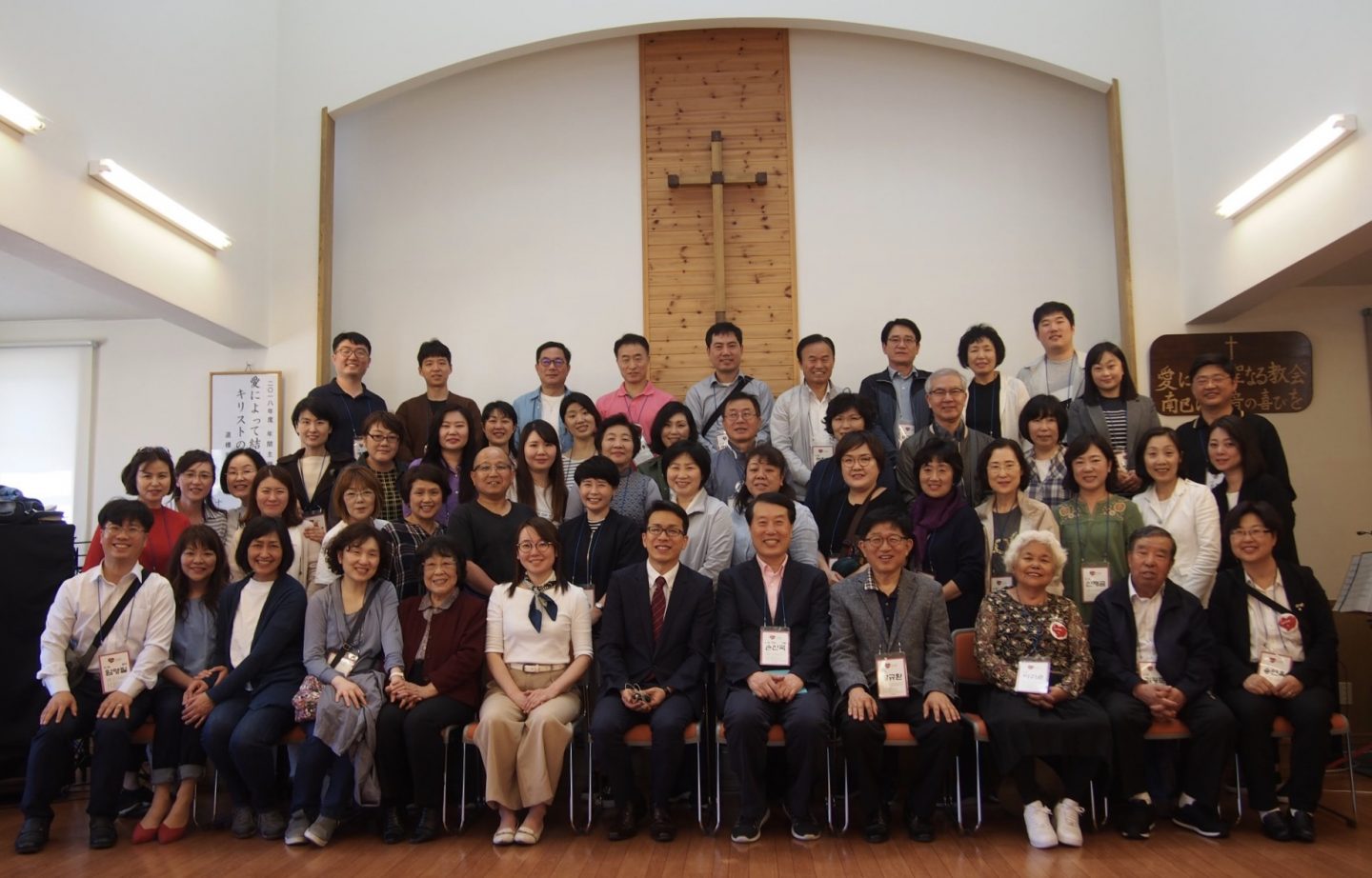
Pastor Tak and Suzuko (middle of the first row) together with their growing congregation at Sapporo Minami Evangelical Christ Church.
Despite these odds, Pastor Tak has witnessed growth in his church in Sapporo.
“We organise English classes or children’s festivals – we go out. That’s how we reach out to the communities.”
When he and his wife first arrived, church attendance averaged 28 people. Three years in, attendance has nearly doubled – thanks to new believers being added, Christians from other cities settling in Sapporo, and overseas Japanese returning home.
The key to reaching the community: Bring the church to the community. (Galatians 6:2, John 15:12-13)
“We were a part of them first, not that they became a part of us. We bring the church to the people. That’s why we organise English classes or children’s festivals – we go out. That’s how we reach out to the communities,” he says.
“Right now, five of our youths are going through baptism class, which is a huge encouragement. Because in Japan, if you have at least one baptism a year, it is considered very good.”
Youthful pursuits
Pastor Tak, now 37, cautions against impatience: “Being a missionary in Japan is more like being part of a team. Sometimes you may not see any fruit for five to 10 years, yet the labour that you do is not in vain. (1 Corinthians 15:58) In His perfect timing, the fruit will come but just maybe not during your time.”
The focus should not be on numbers but on relationships, which takes time to build.
The focus should not be on numbers but on relationships, which takes time to build.
“If you share the Gospel before the relationship is built, they’ll think, ‘You’re not concerned about me, you’re just here because you want to see the fruit .’”
The breakthroughs he has had with the youths came because he had been spending time with them, doing Bible study, playing games and having dinner together every Saturday.
“Bible study time, for me, is just planting the seeds. But during games and dinner time, my antenna is fully operating because that’s when they just blurt out some issues,” notes Pastor Tak, who then takes the opportunity to find out more.
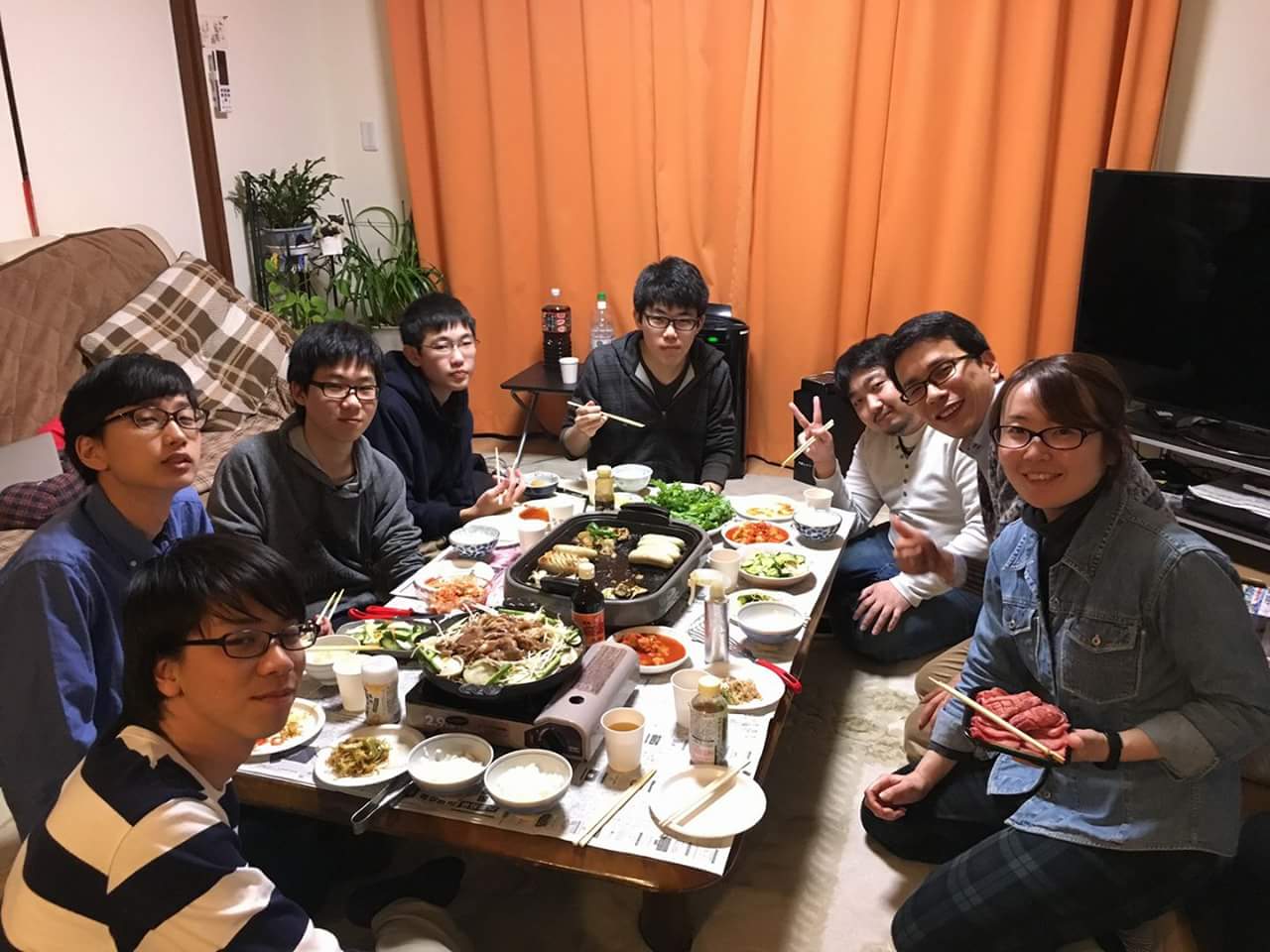
Pastor Tak and Suzuko (rightmost) sharing a meal with the youths.
But he doesn’t stop there.
Knowing how important friendships are to young people, he and other like-minded pastors in Sapporo, who have formed an accountability group, organised a combined youth gathering just this month. (Hebrews 10:24-25)
“Because all the churches are so small (the average congregation size ranges between 20 and 40), we may have only one 16-year-old, one 14-year-old, one 18-year-old. They don’t have so-called peers in church. But when we combine, these youths can connect, share and encourage one other.”
A need for shepherds
“The Japanese church needs shepherd leaders. In a country where 1% follows Christ and where materialism and the traditional Japanese religions of Buddhism and Shinto keep millions in spiritual darkness, living a life committed to Jesus often comes at a significant cost.
“Like Christians everywhere, Japanese believers need encouragement in their walk with Christ, to persevere as the light of the world that Jesus calls them to be.”
With 22 unchurched cities and 546 unchurched towns in Japan, there is much work to be done. Pastor Tak urges the Singapore Church to pray for the country.
“The reason why our ministry is the way it is right now is because of the grace and mercy of the Lord. But at the same time, it is because of all these prayer partners interceding and praying for us continuously,” he says.
He was delighted to hear about the new focus in the Singapore Church to send missionaries to Japan.
He advises those who have a heart for Japan to learn the language as well as the nuances of its culture. Even a native Japanese like himself struggled with くうきをよむ – or “reading the air” – to sense or guess the mood or atmosphere of one’s surroundings, after having lived abroad for so many years.
“Japan is not a poor nation but most Christian workers are very poor.”
Lastly, he encourages the Singapore Church to give financially as well.
“Japan is not a poor nation but Christian population-wise, most Christian workers are very poor,” he acknowledges. Given the small and ageing congregation, most Japanese churches are unable to pay their pastors, much less hire additional staff.
With the high cost of living in Japan, quite a number of pastors and their wives have to work a second job in order to support the family.
Pastors in Japan are often responsible for everything in church, from preaching to teaching and chairing the church board. He himself preaches every Sunday of the year, sometimes at another church as well.
“I’m not ashamed. I’ll say, ‘Please give financially to churches in Japan.’ Because in that way, they’ll be able to get some staff on board to lighten their load.”
Japan has been called the missionaries’ graveyard because many often face burn-out and leave dejected as they only witness a handful of conversions despite their best efforts.
But Pastor Tak is undeterred.
He has tasted the goodness and restoration of God first-hand. And it has given him the confidence to answer the call on his life to bring God’s hope to the Japanese.
After the Sept 6 earthquake
On September 6, an earthquake near Atsuma, Hokkaido, caused devastating landslides that killed 31 and injured over 400.
Sapporo Minami Evangelical Christ Church, together with other churches in Hokkaido, have formed a number of disaster relief teams.
Pastor Tak will be leading a team to the site to help with clean-up and other necessary care. The initial trip planned for October 9 had to be postponed after Typhoon Kong-rey made landfall in Japan.
The main concern is for the 900 people still living in the evacuation centres. Their homes were destroyed by the earthquake and landslides and it will take some time for rebuilding works to begin.
With winter just around the corner and temperatures beginning to drop below 10 degrees Celsius in the mornings, there are concerns for the health and safety of the elderly.
Temporary homes are being built in a rush to make it before snow starts to fall.
If you’d like to pray-give-go, log onto CRASH Japan (Christian Relief, Assistance, Support and Hope) .
To donate to the Church in Japan, please email your enquiry to [email protected], with “Pastor Tak” in the subject heading. We will forward your enquiry to Pastor Tak.
We are an independent, non-profit organisation that relies on the generosity of our readers, such as yourself, to continue serving the kingdom. Every dollar donated goes directly back into our editorial coverage.
Would you consider partnering with us in our kingdom work by supporting us financially, either as a one-off donation, or a recurring pledge?
Support Salt&Light



